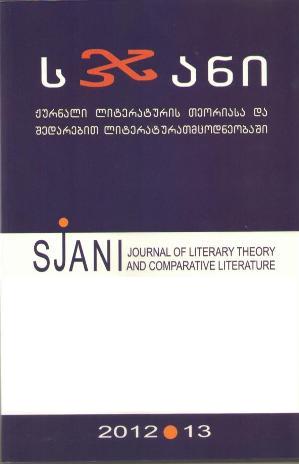აგიოგრაფიის სტილის საკითხები (თეორიული შენიშვნები)
Some Questions of Hagiographical Style (Theoretical remarks)
Author(s): Ivane AmirkhanashviliSubject(s): Literary Texts
Published by: ლიტერატურის ინსტიტუტის გამომცემლობა
Keywords: hagiography; style; genre.
Summary/Abstract: A work of literature always contains more than the author puts into it or implies. The basis of hagiographical work is also a tendency to indicate the subject which is not expressed and let us hear the voice that is not heard. Hagiography is a model, “something” taken in advance that is realized for “something”. Utilitarian function is defined at the outset. This is not free creativity but it is to be taken into account that the demand for freedom appears where there is no freedom. Hagiographic composition is a response to public demand. The society wants to have “such” a hero. Men’s consciousness, taste, social and national interests demand this and the writer fulfills the “order”. The stronger the unity “society – hero – writer”, the easier to make a difference here, bypassing the established rule. The writer does not take into account only the canons of a genre and rhetoric. He takes into consideration the peculiarities of reader’s (listener’s) psychology and perception. This causes activation of creative subjectivity which might not be satisfied only by the use of metaphors and tropes. The activation of subjectivity puts the writer closer to the reality, life, law of life, nature of the things from which such emotional flow may come which gives rise to “noncanonical” impulses of inspiration. It is the moment when the inner vision of the writer comes to the surface and is embodied in a certain form. The extent of these forms is determined by the writer’s taste and the ability to feel the beauty. Specificity is created by the peculiarity of the genre – a composition is written for reading aloud. Therefore, it is impossible not to take into account the canons of rhetoric. There is something that you cannot say in a loud voice there is also something that you should say loudly. Literature is the unity of quietness and talking. It is silence and speech simultaneously. The expression of an idea has its own form. Without this form the idea cannot be expressed. We cannot say that the striving for freedom is noticed in Georgian hagiography but there is a desire to reflect the subject in such way as it is perceived. The freedom of this kind is revealed, for example, when national and cultural motives are rendered. The peculiarity of the art of writing is that there is an idea in it which has roots in the language; the sense of the text is sought in the language; the nature of literary language, its tempting property is just this, that a subject (writer) has a desire and possibility to use the external parameters of language. Genetic logic of a narrative is that it requires “re-fining” of the narration in itself; fictionalization it with figures, images, citations, reminiscences, operation with metre and rhythm m. The theme as a means of persuasion finds ivane amirxanaSvili 13 its full expression in tropology, figurative speech. In this respect hagiographical style is intentional.
Journal: სჯანი
- Issue Year: 2012
- Issue No: 13
- Page Range: 8-13
- Page Count: 6
- Language: Georgian

